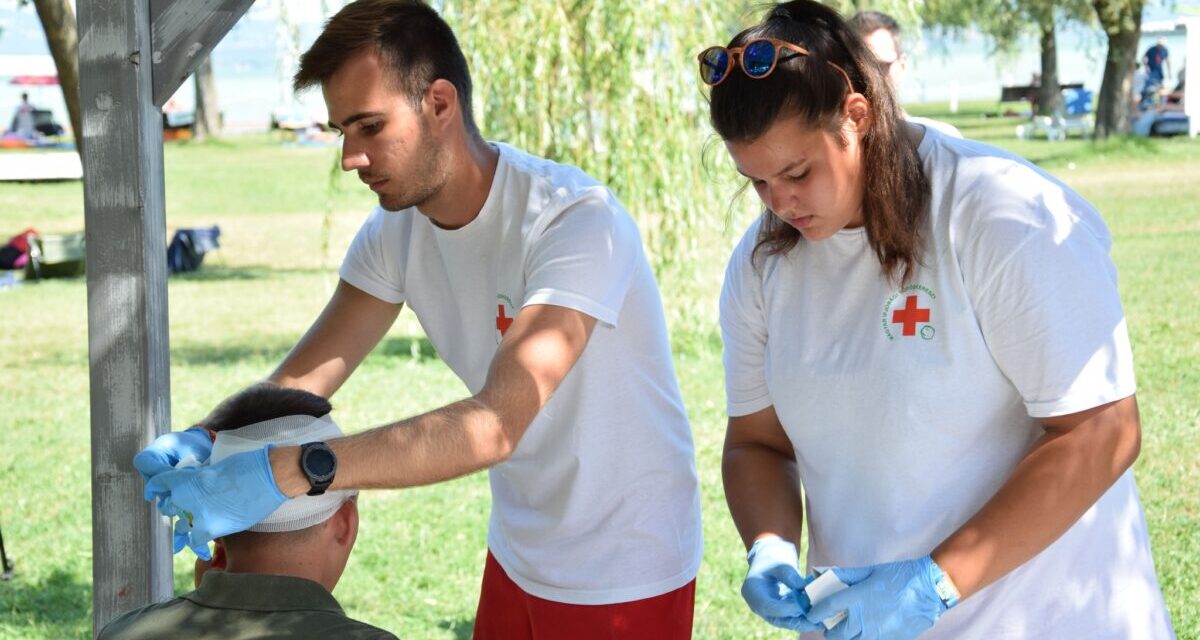Due to the extreme heat, almost as many people got into trouble this year than last year in total, during the entire season.
For years, we have not had to help so many people in trouble and injured on the Hungarian sea as this year. Due to the extreme heat, the self-doubters of the Balaton First Aid Service have a lot to do.
This year, the Balaton First Aid Service, which has been operating since 2007, is providing care for injuries and illnesses on 19 beaches in 13 settlements, with the involvement of two volunteers per beach, until August 20.
The volunteers of the service operated by the Hungarian Red Cross have already helped almost two thousand people in trouble due to the persistent heat wave in July.
According to the professional head of the Hungarian Red Cross, the usual number of cases of two to three thousand cases will increase due to this year's extreme heat.
The third of the planned eight rounds was concluded on Tuesday, and so far almost two thousand cases have occurred, which is an exceptionally high number, this has not happened in the last 18 years - the announcement quotes Ádám Kormos, who indicated that last year during the eight rounds, a total of 2,368 cases required the for first aiders.
The volunteers most often care for cuts, abrasions and insect bites caused by shells or stones, but at the same time, due to the extreme heat, they often have to deal with sunburn, heat exhaustion and sunstroke.
More than 300 young volunteers, many of whom are studying in the health field and will become medical students, contribute to the provision of this year's service of first aiders, which is supported by sponsors. Their task is to provide professional care for injuries and illnesses that occurred in the lake or on the shore, to call an ambulance in the event of a major injury or illness, and to stabilize the patient's condition, and if necessary, begin resuscitation, said István Kardos, director general of the Hungarian Red Cross.
Before arriving at the beach, it is definitely worth checking out the specifics of the place - police colonel László Horváth, head of the Balaton Water Police Department, told hirado.hu about this.
As he pointed out, it is important to find out how deep the water is, whether there are any sudden breaks, holes, currents or currents in the bed. Let's also find out how cold the water is, where the limit of deep water is, where the buoys and the storm signal are located. If you arrive with children, let's see where there is a shallow water area, where there is a part where we can easily keep an eye on them, where they can play safely. This kind of attention consists of only a few important moments, but it can save a life.
If someone is not a confident swimmer, do not go into deep water, and only get on a boat, watercraft such as a pedal boat or SUP if you are wearing a life jacket - this is also highly recommended for those with confident swimming skills.
"If we notice trouble, do nothing except ask for help immediately, which we should do in parallel. So, if we notice that someone is in trouble, we immediately rush to the rescuers, but in the meantime we take out our phone and call 112 or 1817, so the loss of time will be the least," advised László Horváth.
You should not try to rescue a drowning person without practice, because the intention to help is noble, but it often happens that one victim suddenly becomes two.
If we were to drift away lying on the mattress in the water, the most important thing is not to panic! After the first scare, let's collect our thoughts and suppress the fear, no, we won't be the next outcasts.
"Don't get off the device under any circumstances. If we have drifted away with it, don't think that we will only stay alive if we get back to the shore from which we came. This is already impossible in that situation," stated László Horváth.
You are safest when you stay on the device and keep drifting. Rubber mattresses are much more visible, help is called sooner from the shore, because it is easier to spot.
If you get into trouble without a mattress, the best thing you can do is lie on top of the water, fill your lungs with air, and drift with the waves.
Cover image: Volunteers tend to an injured person
Source: Facebook/Hungarian Red Cross













